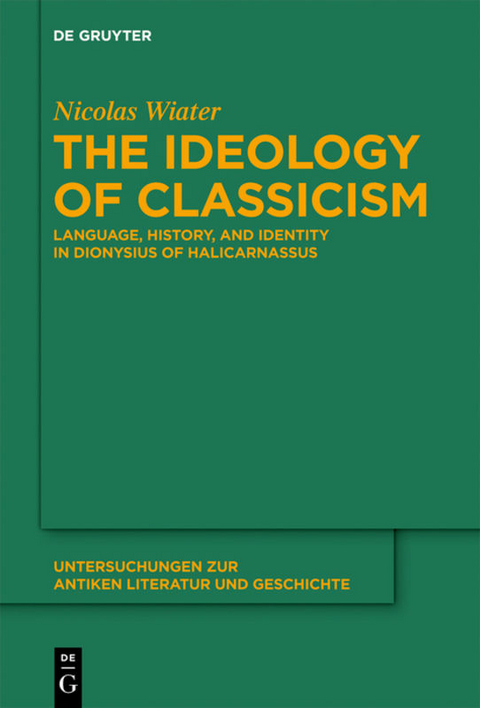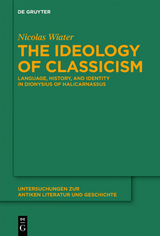The Ideology of Classicism
Language, History, and Identity in Dionysius of Halicarnassus
Seiten
In der 1968 gegründeten Reihe erscheinen Monographien aus den Gebieten der Griechischen und Lateinischen Philologie sowie der Alten Geschichte. Die Bände weisen eine große Vielzahl von Themen auf: neben sprachlichen, textkritischen oder gattungsgeschichtlichen philologischen Untersuchungen stehen sozial-, politik-, finanz- und kulturgeschichtliche Arbeiten aus der Klassischen Antike und der Spätantike. Entscheidend für die Aufnahme ist die Qualität einer Arbeit; besonderen Wert legen die Herausgeber auf eine umfassende Heranziehung der einschlägigen Texte und Quellen und deren sorgfältige kritische Auswertung.
So far, the critical writings of Dionysius of Halicarnassus have mainly attracted interest from historians of ancient linguistics. The Ideology of Classicism proposes a novel approach to Dionysius’ œuvre as a whole by providing the first systematic study of Greek classicism from the perspective of cultural identity. Drawing on cultural anthropology and Social Identity Theory, Wiater explores the world-view bound up with classicist criticism. Only from within this ideological framework can we understand why Greek and Roman intellectuals in Augustan Rome strove to speak and write like Demosthenes, Lysias, and Isocrates. Topics addressed by this study include Dionysius’ view of the classical past; mimesis and the aesthetics of reading; language and identity; Dionysius’ view of the Romans, their power and the role of Greek culture within it; Greek classicism and the contemporary controversy about Roman identity among Roman intellectuals; the self-image as Greek intellectuals in the Roman empire of Dionysius and his addressees; the dialogic design of Dionysius’ essays and how it implements a sense of elitism and distinction; Dionysius’ attitudes towards communities competing with him for leadership in rhetorical education and criticism, such as the Peripatetics and Stoics.
So far, the critical writings of Dionysius of Halicarnassus have mainly attracted interest from historians of ancient linguistics. The Ideology of Classicism proposes a novel approach to Dionysius’ œuvre as a whole by providing the first systematic study of Greek classicism from the perspective of cultural identity. Drawing on cultural anthropology and Social Identity Theory, Wiater explores the world-view bound up with classicist criticism. Only from within this ideological framework can we understand why Greek and Roman intellectuals in Augustan Rome strove to speak and write like Demosthenes, Lysias, and Isocrates. Topics addressed by this study include Dionysius’ view of the classical past; mimesis and the aesthetics of reading; language and identity; Dionysius’ view of the Romans, their power and the role of Greek culture within it; Greek classicism and the contemporary controversy about Roman identity among Roman intellectuals; the self-image as Greek intellectuals in the Roman empire of Dionysius and his addressees; the dialogic design of Dionysius’ essays and how it implements a sense of elitism and distinction; Dionysius’ attitudes towards communities competing with him for leadership in rhetorical education and criticism, such as the Peripatetics and Stoics.
Nicolas Wiater, Universität Bonn, Germany.
| Erscheint lt. Verlag | 17.5.2011 |
|---|---|
| Reihe/Serie | Untersuchungen zur antiken Literatur und Geschichte ; 105 |
| Verlagsort | Berlin/Boston |
| Sprache | englisch |
| Maße | 155 x 230 mm |
| Gewicht | 720 g |
| Themenwelt | Geschichte ► Teilgebiete der Geschichte ► Kulturgeschichte |
| Geisteswissenschaften ► Sprach- / Literaturwissenschaft ► Latein / Altgriechisch | |
| Geisteswissenschaften ► Sprach- / Literaturwissenschaft ► Literaturwissenschaft | |
| Geisteswissenschaften ► Sprach- / Literaturwissenschaft ► Sprachwissenschaft | |
| Schlagworte | Ancient Greece and Rome • Ancient Greece and Rome; Classicism; Augustan Rome; Cultural Identity; Intellectual History • Antikes Griechenland • Antikes Rom • Augustan Rome • Augusteisches Rom • Classicism • Cultural Identity • Dionysius von Halicarnassus • Dionysius von Halikarnass • Intellectual history • Kulturelle Identität |
| ISBN-10 | 3-11-025658-4 / 3110256584 |
| ISBN-13 | 978-3-11-025658-1 / 9783110256581 |
| Zustand | Neuware |
| Haben Sie eine Frage zum Produkt? |
Mehr entdecken
aus dem Bereich
aus dem Bereich
der stille Abschied vom bäuerlichen Leben in Deutschland
Buch | Hardcover (2023)
C.H.Beck (Verlag)
CHF 32,15
vom Mittelalter bis zur Gegenwart
Buch | Softcover (2024)
C.H.Beck (Verlag)
CHF 16,80
Die Revolution des Gemeinen Mannes
Buch | Softcover (2024)
C.H.Beck (Verlag)
CHF 16,80




